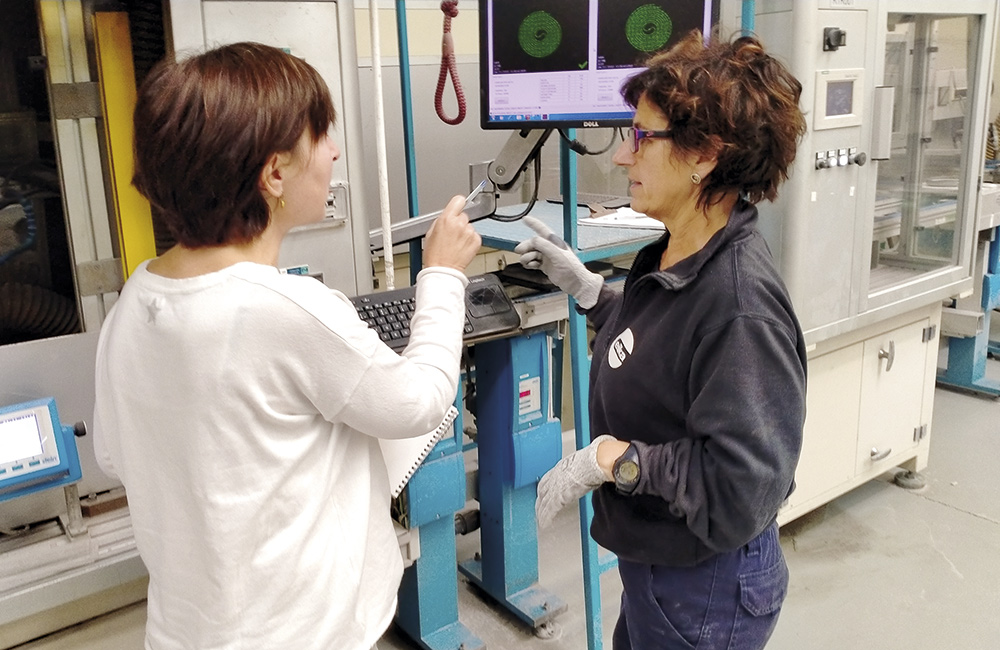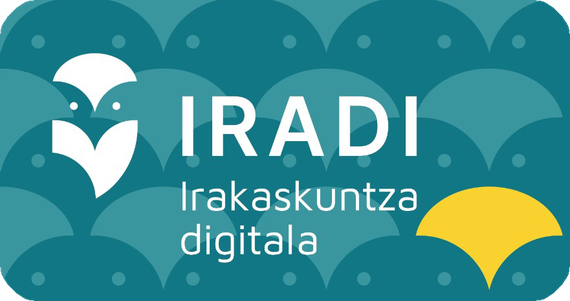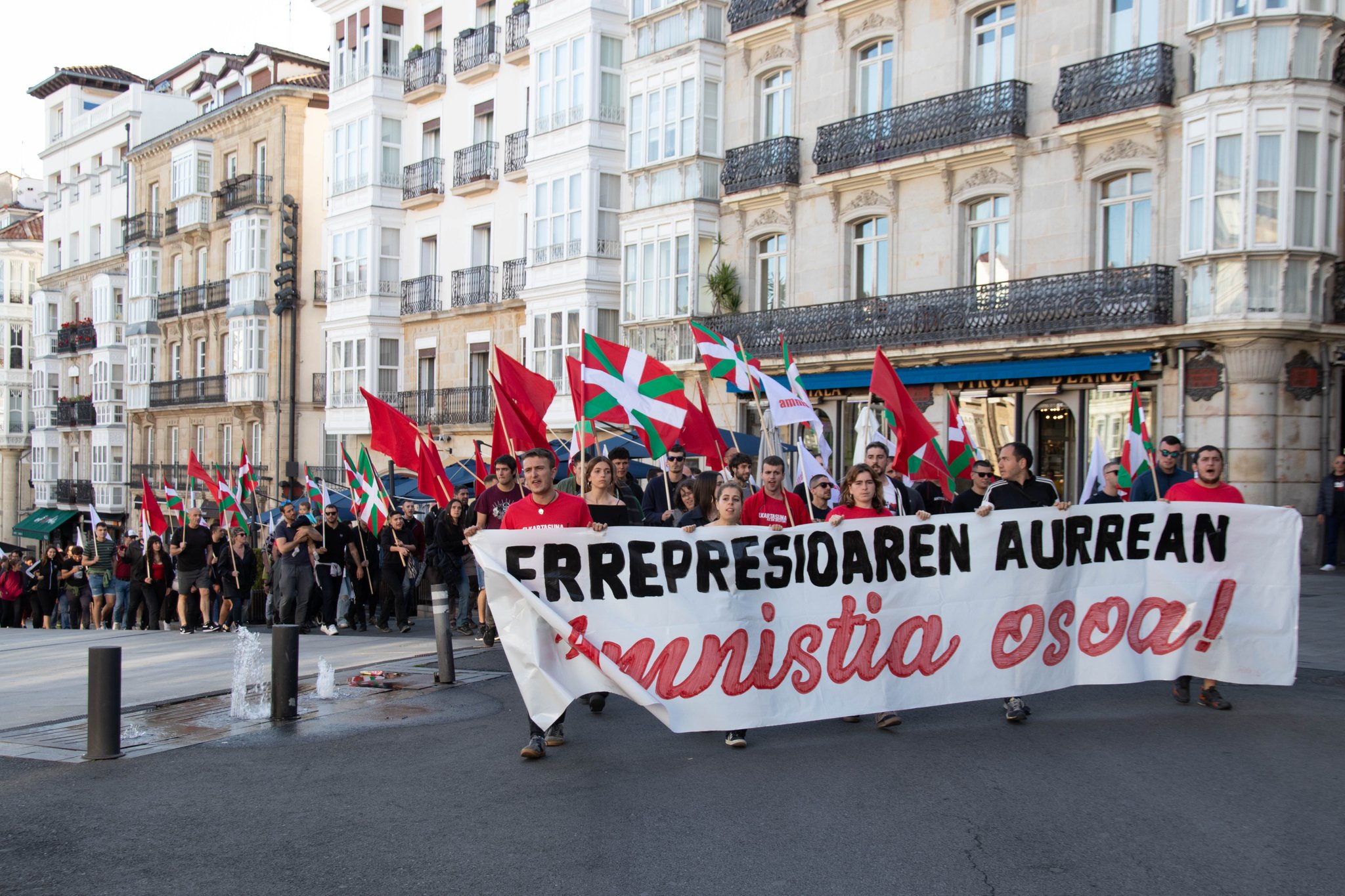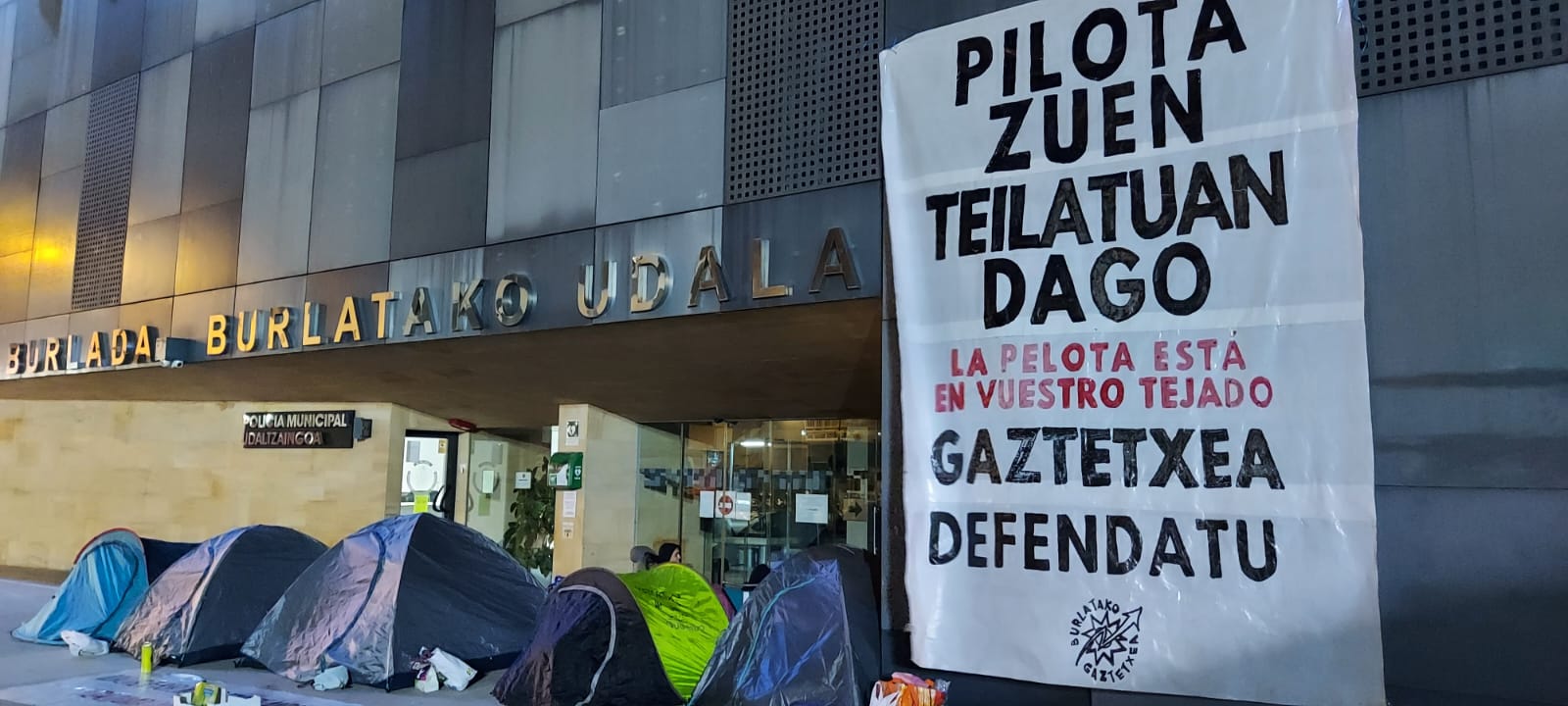From Euskaldunizar workshops to influence social issues
- Emun was born in 1997 with the aim of euskaldunifying the world of work. Gender equality, participation, social responsibility... today is an active agent in other areas, revolving around social innovation. Four workers from the cooperative have told us their experiences and told us about demands other than the legal requirements of gender equality in the Basque country.

We met at the headquarters of Arrasate with Onintza Legorburu and Inma Elexpuru, and at the Andoain office with Mikeldi Zeberio and Maite Inda. In these lines we have taken the reports of the four advisors.
Onintza Legorburu, from 2018 in Emun: After college studies, I worked in a restaurant, and all of a sudden, at age 24, I was going to a big factory of 1,000 workers, hallucinating smell, noise ... It looks silly, but I didn't even know how to dress. Their tools are the special boots that leave you there. "What the hell am I doing with these shoes? I thought. Two parallel worlds come together. College people, more used to being in offices, and we go, I don't know, to an Ederlan foundry, for example, a dark place, fire, dirty people -- and you, there, in Euskaraldia, I don't know what to explain. I have the feeling that at one time Emun members had it much more interiorized. The first Basque plans were developed in the workshops, there were many Basque workers, the wind was tilted, and you approached to explain and explain it, it would seem to you the most logical in the world. But society has changed, and the workplaces too, the Basque movement is much less. The first worker moved and the money for the Korrika was collected by hand. I would be so embarrassed if I did it today (ja ja ja ja ja ja ja ja ja ja ja ja ja).
Inma Elexpuru, since 2000 in Emun: I'm used to workshops. I've had nice surprises. You go to a worker who's in the chain, translating the machine's dashboard into Basque, explaining this and others, and catching you up! "Yeah, keep going, I'm listening," they tell you, without turning a blind eye to the machine. Thank you. Or pandemic. For example, EIKA workers, with headquarters in Etxebarria, spent several days at home, set up Employment Regulation Records, constantly changing safety protocols... The management had to communicate these changes and all communications were made in Basque. They also called us on Sundays at night to ask if they were written correctly, because they wanted to communicate well. In the toughest crises Euskera was also prioritized, they have much merit. EIKA started in 1999 with Emun, with the aim of making its internal functioning fully in Basque. Contracts cover the reception of Castilian speakers, but in an inclusive way. Resources are made available to them to learn Basque, otherwise you would put the whole workshop in Spanish. Members must also know Euskera, since they can become the company’s chairmen, they cannot go back.
Mikeldi Zeberio, since 2007 in Emun: Linguistic management is ongoing. Going back is easy, because reality changes both in society and in companies. In 2016, I stopped working on the Basque plans to further address the governance line. They gave me a sweet taste. Sometimes I worked without knowing where we were going, customers didn't see too many tractions, but by the end of the year their valuation was positive. And I would say to them, "But we haven't done much." But they themselves respond. "No, we're very happy." With any other supplier sure they're more demanding, why not? I thought. I have the feeling that up to one level the changes look good, but from there ... There are actions that are sympathetic, that seek motivation, that really like competitions, but when you start touching structural things...

Maite Inda, since 2017 in Emun: I believe that there are limits in the work on all issues that require social transformation. The reasons why a process starts are different: some start because they believe in it, others because they join the social environment, or from the point of view of profitability, because the training of workers benefits the company, or to comply with the legal framework... In any case, in all cases, social transformation will require you to move things around, change the hiring criteria, for example, address gender issues, wage gap, plurality... If you want to keep doing what you do the same way, don't open that box because it requires change.
M. Zeberium: In large areas, for example, a great effort has been made to unify the linguistic landscape, in posters and others; but in the internal objectives, the conviction that managers and workers have, so... Some key business people can be an obstacle, not least because they “forget” things. I would say that in recent years more concrete plans have been made, specific work with specific people.
H. Legorburu: Emun has historically had a way of working, more in-person, more from within companies, from the bottom up ... This has changed. It is now up to us to influence more than to do. “From the bottom up” is nice to the ear, but there are things that are easy if we do it from the top down. If I have at my side the chief of staff saying “this must be done like this”, for that is how it must be done.
Equality plans are something that has broken the law, but many believe in equality, beyond just marketing strategy. As for the Basque country, some companies are incorporated to obtain the Bikain certificate.
.jpg)
M. Zeberium: Some things have been achieved, making notes in Basque at airports, Euskaldunising the linguistic landscape of shops or that the host staff of the institutions' offices speak in Basque, but with internal objectives... Some projects have not continued. The 2008 crisis facilitated a reduction in the number of posts for Euskera. I think we have relaxed; Emun has more demands for equality than Euskera.
M. Inda: We are increasingly called from more places, and it is clear that this is bound up with the law. We would like to have such measures for the Basque people. It's the usual doubt. How far should we regulate or enforce it and how far should we push it forward? But, which is useful for others, why not for Euskera?
I come from the Basque country, and I am taking advantage of the characteristics of its normalization to develop gender equality plans, to balance footprints. And vice versa. Mainstream or transversality, in which equality policies must be integrated in all departments of an organization, for example, how to do it with the Basque Country? Gender has defined this strategy, what is mainstream, how it should be structured, procedures, resources. They are laid down by law.
M. Zeberium: In the case of minority languages there are two frameworks: the institutional (European charter of minority languages with recommendations) and the universal declaration of language rights (signed by public actors in Barcelona in 1992), but they are not legally executive, there is no obligation.
M. Inda: There is a commitment here to a policy of promotion, in the belief that the Euskaldunization of the new generations will make the whole of society euskaldunice, but this thesis has failed. There has been no obligation, but promotion policies. There is support for the Basque plans, but there is no law. The framework is international on equality: 50% of society has more privileges than the remaining 50%. It is cited, for example, that the crudest manifestation of the situation is male violence. The legal framework of the Basque Country is not so defined.
M. Zeberium: If we talk about terms such as “linguistic substitution”, we would be more courageous in taking action. The CAV Statute itself says that languages are Basque and Spanish. In the State, the legal architecture is descending, if it comes out of the limits marked by the upper... The Constitution itself contains the obligation to learn Spanish and the right to speak of others.
H. Legorburu: With equality there is much more awareness than with Euskera, as in other areas of society. Of course, there are opponents, and they are very opposite, and they are haters, as in the case of the Basque Country. Not many, but they produce a lot of noise, walls... In general, however, it is not necessary to explain why the equality plan will be launched. Of course, when we begin to carry out positive discrimination we will have to give further explanations (ja ja ja ja ja kar).
--------------------------------------------------------
When you believe in participation
Emun has been working in Navarra since 2004. First the commercial plan of the Region of Pamplona and then Fagor Ederlan Tafalla, Mapsa... Membership of the Mondragon Corporation contributed to the implementation of Euskera plans in these companies. In this regard, Maite Inda has highlighted two projects: Strategic plan of the City of Bakaiku, awarded by the Government of Navarra, "In 10 years, do you want to see the empty people?" It was created around the question, in which the value of resident work was captured in an ordinance and the Community project for local cooperation and development in Mimukai, Larraun-Leitzaldea. In Navarra, Emun opened the office first in Villava, but then they moved to Berriozar.
In the area of governance, Mikeldi Zeberio worked mainly in Gipuzkoa. As positive experiences he has commented on initiatives such as those of the terraces of Getaria, the return of the budgets of Oñati or the skate park of Oiartzun, in which many people participated, including a lot of children and young people.
"Many times they ask me: 'But do people participate in those cases? "," he says. "If it is an important issue for citizens, yes, more so when this institution has a trajectory of participation, of credibility to initiate this process". There is often a gap between citizens and administration, even a mistrust, and many organisations are taking the word of neighbours into consideration, although not everyone understands participation in the same way. In the words of the member of Emune, "it is not enough to publish information on the web and put on the board of the City Hall an announcement and something else for complaints, in order to comply with the minimum set by the Basque municipal law of 2016.
Onintza Legorburu is working on the "Debagoiena 2030" project, a collaborative network that aims to drive the transformation towards a smart, inclusive and climate-neutral Debagoiena by 2050. It tells us about the processes initiated in Arrasate, Bergara or Oñati to boost the energy transition, among others.
--------------------------------------------------------
The nature of cooperatives versus the law
Currently, companies in the Spanish state with 50 or more workers have an obligation to have an equality plan.
Companies must first carry out a diagnosis of the situation that shows “sensitive” data: the level of the wage gap, the number of people who can and take conciliation measures, the gender base data, the number of men/women recruited in recent years for each post, the number of men/women in command bodies, etc. Subsequently, in order to fill the gaps raised by the diagnosis, an equality plan will be drawn up and approved by the negotiating table before registration in the administrations.
What is happening in cooperatives, in the case of many Emun customers? The lack of a trade union makes it difficult to comply with those set by the State and, consequently, to achieve the points the plan would have in the tenders. In order to set up the negotiating table and register the plan cooperatives are obliged to convene the majority union in the sector, which means that someone outside the company will have access to internal information and direct participation in gender decisions.
Emun participates in the whole process, leading the negotiating tables, developing the diagnosis, completing, registering and implementing the plan.
Aranzadi Zientzia Elkarteko Etnografia Sailaren zuzendari berria da Maite Errarte Zurutuza (Beasain, 1995), urrian Fermin Leizaolaren lekukoa hartu ondoren. Kultura materiala aztertzen jarraitzeko beharra azpimarratu du, gizartearen memoria eta bizimodu aldaketak erregistratzeko... [+]
2020. urteko udaberrian lorategigintzak eta ortugintzak hartutako balioa gogoan, aisialdi aktibitate eta ingurune naturalarekin lotura gisa. Terraza eta etxeko loreontzietan hasitako ekintzak hiriko ortuen nekazaritzan jarraitu du, behin itxialdia bareturik. Historian zehar... [+]
Aspaldi pertsona oso zatar bat ezagutu nuen, urrun izatea komeni den pertsona horietako bat. Bere genero bereko pertsonengana zuzentzeko, gizonezkoengana, “bro” hitza erabili ohi zuen. Edozein zapaltzeko prest zegoen, bere helburuak lortzeko. Garai hartatik hitz... [+]
Hurrengo ariketa egin ezazu zure lantokian, euskaltegian edo gimnasioan:
Altxa eskua Minneapoliseko George Floyd nor den dakizuenok.
Altxa eskua Madrilgo Mame Mbaye nor den dakizuenok.
Altxa eskua Barakaldoko X nor den dakizuenok.
Mame Mbaye manteroa duela zazpi urte... [+]
Joan den urte hondarrean atera da L'affaire Ange Soleil, le dépeceur d'Aubervilliers (Ange Soleil afera, Aubervilliers-ko puskatzailea) eleberria, Christelle Lozère-k idatzia. Lozère da artearen historiako irakasle bakarra Antilletako... [+]
“Saihestu egingo dira giza eskubideen, ordenamendu juridikoaren eta espetxeetako tratamendu psikosozialaren aurkako balioak eta jarrerak babestea, justifikatzea eta goratzea ekar dezaketen adierazpenak”, dio, besteak beste, agiriak. Azaroan Eusko Jaurlaritzako... [+]
Gogora Institutuak 1936ko Gerrako biktimen inguruan egindako txostenean "erreketeak, falangistak, Kondor Legioko hegazkinlari alemaniar naziak eta faxista italiarrak" ageri direla salatu du Intxorta 1937 elkarteak, eta izen horiek kentzeko eskatu du. Maria Jesus San Jose... [+]
EAJk, EH Bilduk eta PSE-EEk ekimen bat adostu dute Eusko Legebiltzarrean Hezkuntza Sailari eskatzeko Iradi software libreko hezkuntza plataforma hedatzen jarraitzeko. Zenbait ikastetxetan ezarri da Iradi orain arte. Baliabide partekatuak, komunikazio zerbitzuak (e-posta eta... [+]
Oier Sanjurjo Maté hautatu dute Nafarroako Ikastolen Elkarteko lehendakari. Atzo egindako asanbladan erabaki zuten izendapena. "Mugarri garrantzitsua da euskarazko hezkuntzaren etorkizunerako foru erkidegoan", adierazi du Ikastolen Federazioak ohar batean.
A-15 errepideko trafikoa N-I errepidearekin bat egiten duen tokian eraikiko litzateke lotune berria. Andoainen N-I errepidearen "afekzioak murriztu" eta ingurunean "modu hobean" integratuko dela adierazi du aldundiak. Udalak 2011ko eta aurtengo proiektuen... [+]
Eskolaz kanpoko jardueren eskaintza zabala egiten duten ikastetxeen aldean, beste askok ez du horretarako aukerarik; eta eskola bereko ikasleen artean ere, denek ezin dute ekintzetan parte hartu, baliabide ekonomikoek baldintzatuta. Esku hartzeko dei egin diete instituzioei:... [+]
Bilboko Arrazakeriaren Aurkako Asanblada Arrazakeria ez da eztabaidatzen, borrokatzen da. Ordena kolonialari sua! lelopean antolatu du mobilizazioa, Arraza Diskriminazioa Ezabatzeko Nazioarteko Egunean. Gizarte eta erakundeei "iragan esklabista eta koloniala"... [+]
2023an Zaballako espetxean euskal presoen alde egindako martxarengatik ezarri zizkieten isunak. Helegiteen ezeztapenaren aurrean epaitegietara joko dutela adierazi du antolakundeak, eta Poliziaren inpunitatea salatu du.
Endometriosiaren Nazioarteko Eguna izan zen, martxoak 14a. AINTZANE CUADRA MARIGORTAri (Amurrio, 1995) gaixotasun hori diagnostikatu zioten urtarrilean, lehen sintomak duela lau urte nabaritzen hasi zen arren. Gaitz horri ikusgarritasuna ematearen beharraz mintzatu da.
EH Bildu agintean dagoen udalak gaztetxearen etorkizuna ziurtatzeko aterabide bat adosteari "uko" egin diola salatu du Burlatako Gazte Asanbladak. Beste hainbat gaztek udaletxe kanpoan kanpatu dute, eta goizean zehar bertara hurbiltzeko dei egin dute.

























